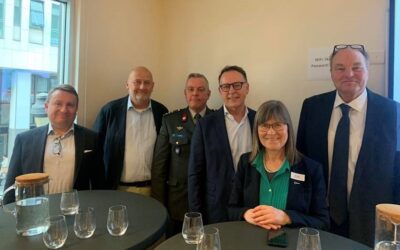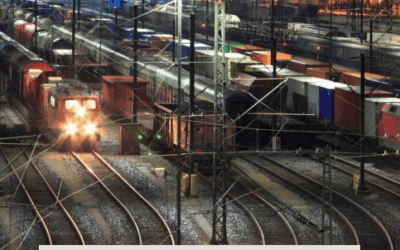On 14 October 2025, STRING gathered policymakers, defence experts, infrastructure leaders and regional representatives in Brussels for its flagship annual conference, State of the Megaregion 2025, under the theme Infrastructure and European Cross-Border Coherence in the New Geopolitical Era.
Held amid growing geopolitical uncertainty and renewed focus on European security, this year’s event explored how cross-border infrastructure and regional cooperation are becoming vital enablers of both defence resilience and sustainable integration.
Infrastructure as Europe’s Strategic Backbone
Moderator Connie Hedegaard, former Danish Minister and European Commissioner, opened the day by framing megaregions like STRING as strategic drivers of resilience, sustainability and security. She called for closer alignment between regional collaboration and Europe’s wider green and defence ambitions.
European Commissioner for Energy and Housing Dan Jørgensen followed with a keynote setting the political context: the intersection of energy, housing and infrastructure with Europe’s security imperatives in a shifting global landscape. He reflected on the NATO 5% defence spending pledge, which commits up to 1.5% of GDP to infrastructure, underscoring the growing convergence between energy policy, mobility and defence preparedness.
Brigadier Stefan Lampl, Director of Logistics at the European Union Military Staff (EUMS), brought a strategic perspective from the military domain, highlighting how logistics and cross-border mobility are becoming decisive enablers of Europe’s crisis readiness. He emphasised the importance of dual-use infrastructure serving both civilian and military needs.
Panel 1: Leveraging NATO’s 5% Pledge
The first panel explored how NATO’s new defence spending commitment could act as a catalyst for infrastructure modernisation across Europe. Panellists Alberto Mazzola (CER), Major Radu Cajocariu (EUMS), Kristian Bischoff (Risk Intelligence), Martin Zeitler (DG MOVE) and Hanne Klintøe (Aabenraa Municipality) discussed how the 1.5% infrastructure dimension of the pledge could accelerate investment in critical corridors, close cross-border gaps and enable projects that support both security and green transition.
The discussion underlined that mobility is now a matter of defence – and that regions like STRING are uniquely positioned to translate strategic ambitions into practical results on the ground.
Regional Resilience from the Ground Up
After a short break, Soo-Jin Kim, Deputy Head of Division at the OECD’s Cities, Urban Policies and Sustainable Development, offered insights on how cities and regions are responding to global megatrends from climate change to digitalisation. She emphasised that cross-border alliances are becoming critical laboratories for Europe’s resilience – driving innovation and practical cooperation where national action alone may fall short.
Panel 2: Regionalisation in a Fragmented Europe
The second panel turned to how regional and cross-border organisations can fill gaps of coherence in an era of fragmentation. Soo-Jin Kim moderated a discussion with Dr. Ulf Kämpfer (Mayor of Kiel and Chair of STRING), Dr. Robert Gold (Kiel Institute for the World Economy), Rickard Carstedt (Region Västerbotten and Kvarken Council) and Cecilia Linder (Region Uppsala and Mälardalsrådet).
Speakers discussed how megaregions are evolving from policy implementers to strategic actors, capable of translating European ambitions on climate, energy and mobility into tangible cross-border action. From the Nordic-Baltic corridors to the STRING region’s Green Hub vision, the discussion underscored that regional cooperation is becoming a cornerstone of Europe’s strategic coherence.
Closing Reflections
In his closing remarks, Dr. Ulf Kämpfer reflected on the day’s discussions as a call to action for Europe’s megaregions to link green transition, security and connectivity agendas more closely. He underlined that STRING’s mission – to build a connected, resilient and sustainable megaregion – has never been more relevant in ensuring Europe’s unity and preparedness in uncertain times.
The day concluded with a networking reception where participants from across Europe continued their conversations and explored new opportunities for partnership and collaboration.




